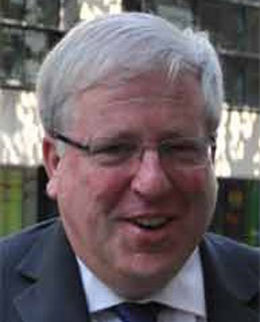Posted 6th September 2012 | 2 Comments
New Transport team must hit ground running

Patrick McLoughlin is the new transport secretary after Tuesday's reshuffle
THE NEW transport secretary Patrick McLoughlin has moved into his Marsham Street office to find a bulging 'in' tray. He was named by the Prime Minister as the replacement for Justine Greening earlier this week. Critical matters needing his urgent attention include the West Coast controversy, in which a decision made by his Department now faces scrutiny by the Commons Transport Committee and also, potentially, by the High Court.
The Department for Transport named FirstGroup as the winner of the Intercity West Coast franchise on 15 August, but defeated contender Virgin Trains filed papers at the High Court objecting to the decision on 28 August, just one day before the award could be legally signed off.
Another week passed before ministers admitted that Virgin's move meant that completion of the contract had to be put on hold. A date for the first hearing by a judge has yet to be announced, but unless the Virgin claim is rejected at the first hurdle a full judicial review could follow. If this happens, the fate of the West Coast franchise may remain uncertain for months, although FirstGroup is still currently preparing to take over as planned on 9 December.
If judges agree with Virgin's contention that the DfT's processes were flawed, they could order that the contest must be re-run. This would not only push the takeover well into 2013, but also cast doubt on the other franchise competitions which are under way. The Department is planning to complete the award of new contracts for Essex Thameside, Greater Western and Thameslink in the coming year, and a re-run West Coast competition could disrupt that timetable.
Meanwhile, the House of Commons Transport Committee is preparing to hear evidence from two of the bidders for West Coast on Monday. Sir Richard Branson of Virgin and Tim O'Toole of FirstGroup are among the key figures who have been summoned to appear. The chairman of the Committee, Louise Ellman, had called for the final signing to be delayed until her Committee could hold an inquiry. Although the DfT had not apparently been willing to yield to her, its hand has been forced by the possibility of High Court action.
Other major railway issues which will be occupying the new Transport Secretary's attention include the much-delayed financial close of the order for more than 1,100 new vehicles for Thameslink, for which Siemens was named preferred bidder in June 2011. Shortly before she departed, rail minister Theresa Villiers had predicted that the final sign-off could be expected in 'early autumn', but the delay in this process has already caused speculation that the cascade of existing rolling stock to newly-electrified lines will also now fall behind schedule, raising the possibility that some electrification schemes in the north west of England could now be completed before any rolling stock is available for them.
Next on the list is HS2, and here the DfT knows that some of the process will be examined by the High Court in December, because five groups of objectors have won their case for a judicial review. This was granted for various reasons, but one particular problem for the DfT will be the revelation that around 400 responses to the official consultation were mislaid last year.
Patrick McLoughlin will also be facing other highly controversial transport issues, including the revived debate about a third runway for Heathrow.
Most of his ministerial team will be new to their jobs, because only Norman Baker has survived Tuesday's reshuffle. Theresa Villiers has become Northern Ireland secretary and has been replaced by Simon Burns, while Mike Penning is now a minister in the Northern Ireland office and has been succeeded at Transport by Stephen Hammond.
Yet another shake-up at Transport has prompted the Chartered Institute of Logistics & Transport to point out that there have been seven transport secretaries since 2006 alone, and it is calling on the Government to 'put long term planning at the heart of transport'.
CILT chief executive Steve Agg said: "People are really only finding their feet in the first year of any appointment. Considering the huge importance of some of the major questions which the transport secretary faces, there is a strong case to be made that the role should be considered more than an interim position."
Reader Comments:
Views expressed in submitted comments are that of the author, and not necessarily shared by Railnews.

William auld, Edinburgh
Its clear that Virgin aim to pay the government less but plan to spend more money on passengers and stations, so in a nutshell either the government give the people value for money and take a heathy slice of the pie or go with first and share the spoils between them and stuff the passengers.
Billy Bell, Beith, UK
What is the point anymore?
The government are absolutely useless and are not doing what they were elected to do.